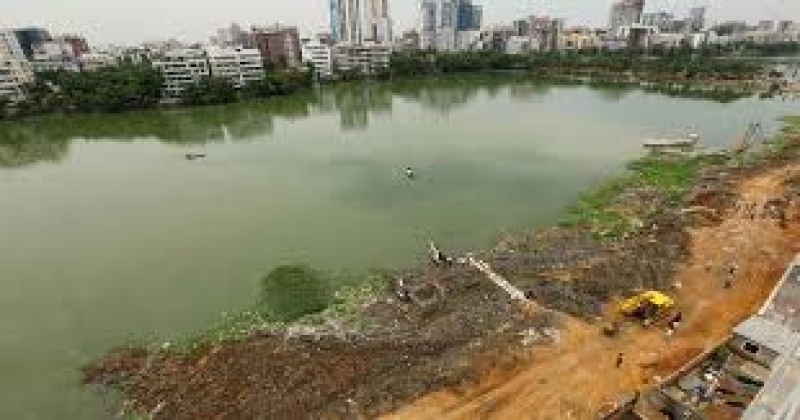- Trump considering military options on Greenland; Europe rejects |
- Fertiliser crunch threatens Kushtia’s onion boom despite high prices |
- Security Council Divided on United States' Venezuela Action |
- Over 1.53m voters register for postal balloting: Shafiqul Alam |
Gulshan-Banani Lake Restoration Could Yield Tk 300,000Cr

A recent study reveals that restoring the Gulshan-Banani Lake, a key Ecologically Critical Area (ECA) in Dhaka, could unlock economic benefits worth Tk 300,000 crore over the next two decades.
The study, led by the ReWET consortium, represents the first comprehensive economic valuation of an urban wetland in Bangladesh. Titled "Primary Economic Analysis for Climate Impacted Dwellers-led Agro-Ecological Stewardship for Restoring Wetlands (Re-WET)," it assesses the long-term value of the ecosystem services provided by the Gulshan-Banani Lake.
The lake is part of the larger Gulshan-Banani-Baridhara wetland complex, which borders the Korail slum—the largest informal settlement in Bangladesh, home to over 250,000 people. The study models a 20-year restoration scenario where local residents are trained as stewards of the wetland. The findings suggest that the restoration could generate Tk 10,600 crore annually, with a cumulative total of Tk 300,000 crore over 20 years.
The research, conducted along a 2-kilometre stretch of the lake, aggregates the value of ecosystem services and the costs avoided through restoration. Key highlights from the study include:
- Fisheries and Aquaculture: Tk 8.635 crore annually, supporting local livelihoods.
- Climate-Smart Agriculture: Tk 12.5 crore per year.
- Municipal Water Substitution: Tk 18.75 crore annually.
- Climate Regulation: Carbon sequestration contributing Tk 84 crore each year to mitigating climate change.
- Flood Regulation: Tk 43.24 crore in annual benefits from flood control and water retention.
- Cultural and Recreational Services: Green spaces and eco-tourism opportunities valued at Tk 200 crore per year.
- Education and Cultural Services: Tk 3,002 crore annually through civic and ecological education, community programs, and research.
- Biodiversity: Preservation of unique flora and fauna, valued at Tk 37 crore annually.
- Land Value: Potential rise in land values by Tk 5,000 crore per year.
Challenges and Environmental Pressures
Despite its ecological importance, the Gulshan-Banani Lake faces significant threats from urbanization, pollution, and encroachment. Korail’s socio-economic challenges are compounded by the lake's degradation, with pollution from untreated sewage, waste dumping, and poor waste management disproportionately affecting the community.
Pathways for Restoration
The ReWET study proposes several restoration strategies to reverse the lake’s decline:
- Creating protected buffer zones around the lake.
- Building wastewater treatment infrastructure.
- Reintroducing native plant species and wildlife.
- Promoting climate-smart agriculture and aquaculture among local residents.
- Offering micro-financing to foster green businesses.
- Implementing payment-for-ecosystem-services models.
- Encouraging public-private partnerships to fund restoration efforts.
Project Overview
The ReWET project is part of the Reversing Environmental Degradation in Africa and Asia (REDAA) program, funded by the UK Foreign, Commonwealth and Development Office (UK FCDO) and managed by the International Institute for Environment and Development (IIED). The project is led by the University of Sheffield, UK, and implemented by the River & Delta Research Centre (RDRC) in Dhaka, with support from experts in environmental design, policy, and finance from Smith College, USA, and Sheffield Hallam University, UK.
Utilizing a Total Economic Value (TEV) framework, the study combines both qualitative and quantitative approaches to assess ecosystem services and model restoration outcomes.
Expert Insights
Saifullah Khaled, a climate finance expert and Assistant Professor of Finance at Sheffield Hallam University, emphasized the immense potential of nature-based solutions: “The value generated from the restoration of Korail Lake—Tk 10,600 crore per year and Tk 300,000 crore over 20 years—is only the beginning. There are many additional co-benefits and multiplier effects that we couldn't capture in this valuation,” he said.
Efadul Huq, Assistant Professor of Environmental Science & Policy at Smith College, stressed the importance of community involvement: “Restoring Dhaka’s urban wetlands is not just about environmental sustainability; it’s about fostering social inclusion and empowerment. Local residents must play an active role in the restoration process, with their knowledge and needs at the forefront,” he stated.
Mohammad Azaz, Chairman of the RDRC, underscored the collaborative nature of the project: “Our approach involves close cooperation with government agencies, community members, and other stakeholders to restore the Gulshan-Banani Lake. The goal is to revive its ecological functions and improve the livelihoods, resilience, and well-being of those who rely on it.”
By combining community engagement with scientific research and policy interventions, the ReWET project aims to set a precedent for urban wetland restoration in Dhaka and beyond.

